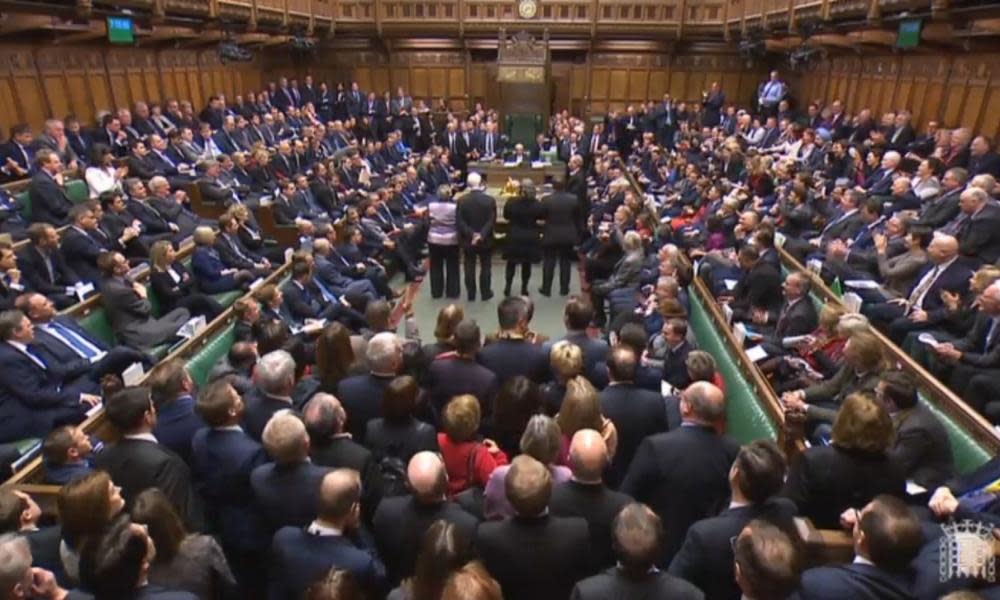The Tory rebels are emboldened by their success. They won’t stop now | Andrew Rawnsley

The spectacle of a control freak losing control is generally satisfying, but not to Tories who are angry about the government’s first major defeat in parliament since the election. Casting around for places to allocate the blame, some fingers are being pointed at Julian Smith.
The relatively new chief whip is being accused of misreading and mishandling the rebellion that saw Tory MPs combine with the opposition to insert a legal guarantee that parliament will have a vote on the eventual Brexit deal. “The first job of the chief is to be able to count,” complain some of his colleagues, echoing Lyndon Johnson’s famous saying about what most matters in politics.
It is obvious that the Tory whipping operation didn’t work, since it is rule number one not to lose a vote. Gavin Williamson, Mr Smith’s predecessor as chief whip, liked to boast that he never lost a single division in the Commons, although he only kept that record intact by swerving any vote that came with the risk of defeat and getting himself promoted to defence secretary before the parliamentary slog over Brexit became seriously heavy.
In truth, Mr Smith’s skill, or lack of it, at whipcracking is not the important reason why the government was defeated this time and will likely lose again in the future. The important reasons are these. The prime minister lacks authority. She may often behave as if she has a steamroller mandate, but she only has a slender parliamentary majority bought from the Democratic Unionist Party. That would make life difficult enough even without Brexit. This requires gargantuan slabs of legislation which has created a parliamentary battleground in which fiercely held principles are contested and high passions are aroused.
This combination of prime ministerial weakness, precarious parliamentary arithmetic and complex and contentious legislation on a hugely divisive issue is compounded by a longer term trend which makes whipping still more difficult. Parliamentarians of all parties have been growing more rebellious over the years. We know this from the valuable work of Philip Cowley, a political scientist at Queen Mary University of London, and his colleague Mark Stuart. They have made a speciality of recording and analysing the trend.
Mutiny by government backbenchers, a rarity in the 1940s and 1950s, has increased over the decades since. Labour MPs became steadily more rebellious after their party came to power in 1997. This was often disguised by the size of Tony Blair’s majorities, but not always. Even when he had a landslide majority, he came within four votes of a defeat on tuition fees.
One Jeremy Corbyn voted against the whip on 428 occasions when his party was in power – and a further 189 times when it was in opposition – making a career total of 617. It is probably an encouragement to rebels of all parties that he is now Labour leader and, for some of his supporters at least, his record is taken as a signifier that he is a man of principle and authenticity. He does not wear his past disloyalty to the party whip as a mark of shame, but as a badge of pride. The Tory MPs who rebelled against Mrs May do the same. That would worry me if I were the prime minister.
Tory MPs developed a taste for rebellion during Sir John Major’s tormented government in the 1990s. In those days, the revolts over Europe came from the phobic right of the party. The last people in a position to demand that loyalty to party ought to prevail over conscience are Brexiters of that vintage, some of whom were dubbed “bastards” by Sir John as they ate his government alive. What is sauce for the goose.
There was even more Tory rebellion during the coalition years. In one of the coalition’s parliamentary sessions, approaching half of divisions saw one or more government MPs vote against the government.

One explanation for this rising tide of backbench rebellion is that whips have lost many of the tools they once used to coax and cow their MPs. They were deprived of valuable patronage power when they had to surrender control of appointments to select committees. Arm twisting of potential rebels is more dangerous than it was in the old days when bullying was regarded as a legitimate weapon in the whips’ armoury. MPs who are leant on are much more likely to complain about it and to do so publicly. Whips can still menace a backbencher’s career prospects, but that doesn’t work terribly well if a rebel-inclined MP has already been a minister, and there are quite a lot of ex-ministers sitting on the Tory backbenches. It is notable that the majority of last week’s rebels were former ministers. “You’d be unwise to cross the prime minister” might have worked as a threat when Mrs May looked like the queen of all she surveyed. It doesn’t have so much traction when it is the working assumption of most Tories that she won’t be their leader by the time of the next election.
Some of the Tory press have tried to intimidate the rebels by vilifying them as “malcontents” and “traitors”. There have also been a few hysterical bellows for de-selection. That is nasty. It also appears to be pleasingly counter-productive for the government. Some of the rebels say that the attempted character assassinations only served to strengthen their resolve and cement their comradeship. Voters usually tell interviewers that they don’t like lobby-fodder MPs and express a preference to be represented by independent-minded parliamentarians who stick to their principles. Which is precisely what Dominic Grieve and his fellow rebels were doing when they insisted on proper parliamentary scrutiny of Brexit.
That leaves the whips with one ultimate threat – the nuclear weapon – which I expect they will be rolling out in future because there will be a lot more tight fights and close calls over Brexit legislation down the line. The big bogey is to try to terrify potential rebels with the idea that defeating Mrs May on anything significant could collapse the government and precipitate an election.
The trouble with this as a frightener is that it is very hollow. No amount of amending of the various pieces of Brexit legislation can, by itself, cause an election. Under the Fixed-term Parliaments Act, there are two mechanisms for removing the government. One way would require either the DUP or some Tory MPs to join the opposition in support of a motion of no confidence in the government. The Queen would then ask Jeremy Corbyn to see if he could form a government which commanded the support of parliament. If he couldn’t, an election would follow. I guess we should never say never to anything these days, but it is extremely hard to see the DUP or any Tory MP voting to set off that chain of events.
The alternative mechanism for ending the government would require the DUP and a wedge of Tories to vote with the opposition on a motion to call an election. Again, you have to say never say never. Again, you have to think that this looks a bit less likely than Lord Lucan turning up in Parliament Square riding Shergar. I say that not just because the DUP can’t stand the idea of Mr Corbyn in Number 10. I say it also because a hung parliament really suits them because it gives them leverage worth £1bn and counting so far.
The precise effect of the rebel amendment on the Brexit process is as yet unknown. What we can say now is that it is not a good look for a government to lose a vote on flagship legislation. It is also cheering for the opposition, literally so. Cheer they did, Labour, Lib Dem and Nationalist MPs when the tellers read out the numbers on Wednesday night.
Rebellions in the Commons have another effect, which is that they tend to embolden the House of Lords to be difficult. It has long been thought in government that the Brexit legislation will face its roughest passage when the bills reach the upper house. The majority of peers were opposed to Brexit. Tory lords and ladies are less than a third of the total population of the upper house. They are easily outnumbered by opposition peers and the crossbenchers. For the government to get its way, ministers were relying on the unelected upper house’s traditional reluctance to defy the clearly expressed will of the Commons. If the government is being defeated in the Commons, peers are more likely to stand firm on their objections to the Brexit legislation.
A final reason for Mrs May and her whips to worry about this defeat is that rebellion can be contagious. As one veteran rebel against his party once put it to me: “It’s like murder is said to be. The first time is the hardest. The more often you do it, the easier it gets.”
The EU withdrawal bill is only the first course of the groaning menu of Brexit legislation that will be served up to parliament over the coming months. There are at least eight more bills to be chewed through. Mrs May and her whips had better get accustomed to the sour taste of defeat because this first one is unlikely to be the last.

 Yahoo News
Yahoo News 
